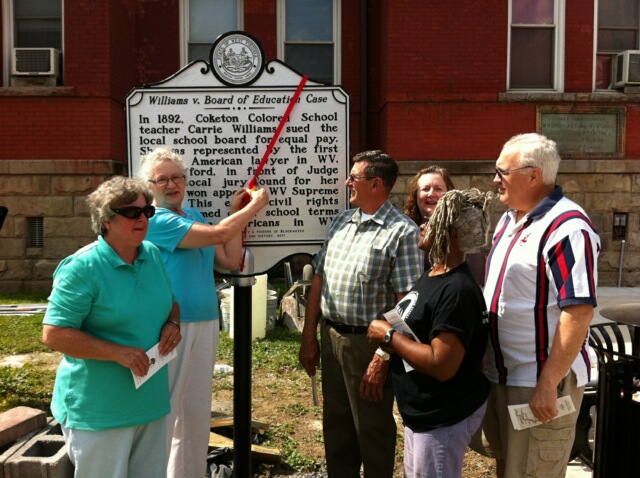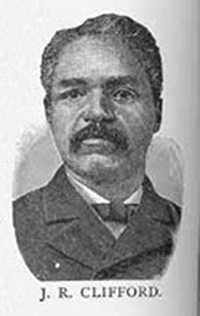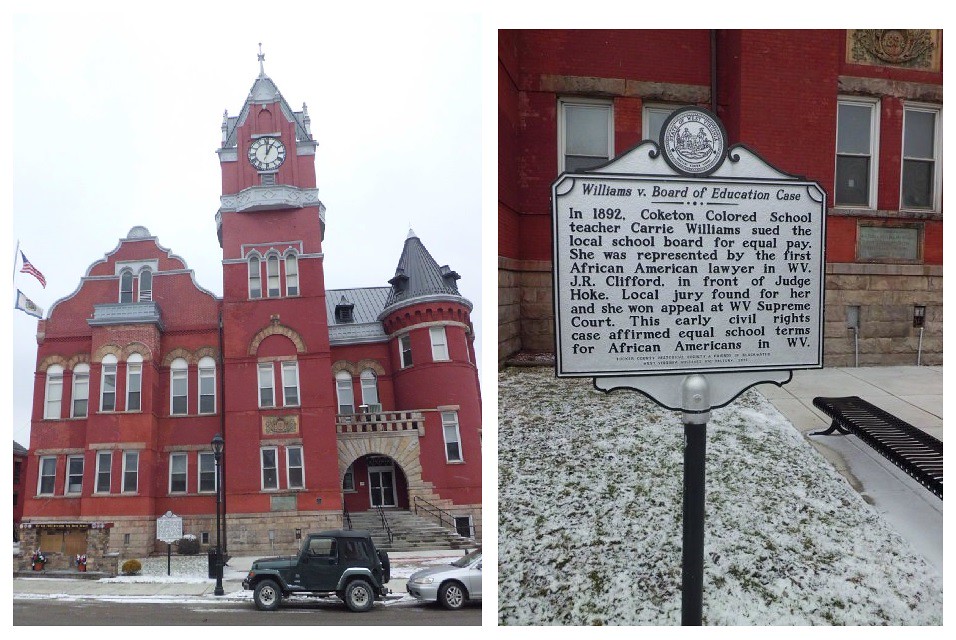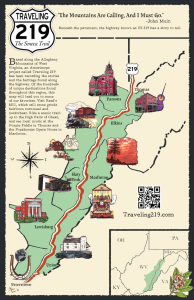The 1892 Civil Rights Case of Coketon, West Virginia
About a year ago, a new historical marker sign went up in front of the Tucker County Court House, in Parsons, West Virginia along U.S. Route 219. The sign commemorates an exceptional story in West Virginia history, when a brave African American school teacher stood up to her local school board and sued them for discrimination. Her lawyer, J.R. Clifford, was not only a prominent civil rights activist, but also the first African American lawyer in West Virginia’s history. Plus, this was the 1890s. Their victory in court was the first civil rights case in the country’s history to determine discrimination on the basis of color to be illegal. To learn more, I went over to check out the new historical marker sign in Parsons, where I met with Mont Miller, who helped get it installed.

Mont Miller, far right, at the dedication of the Carrie Williams v. Tucker County Board of Ed. Case historical marker in Parsons. From left to right: Alice Phillips; Judy Rodd, FOB Director; Lowell Moore, Tucker County Commissioner; Rosemarie Davis, President-Tucker County Historical Society, Jean Evansmore, and Mont Miller. Photo courtesy of www.jrclifford.org
“Hello, my name is Mont Miller, prosecutor for 32 years here, retired. We are in front of the Tucker County Courthouse, where the actual Carrie Williams case was held in 1892. It was a very good item to get the sign up and get the history out, because nobody here, even I, never heard of JR Clifford, and we jumped on board because we thought ‘hey, this is really good and the public needs to know about.'”
So what did happen here in 1892? When the all white Tucker County Board of Education instructed the Coketon Colored School’s teacher Carrie Williams to cut the school year and teach three months less than the county’s white schools, she decided to do something about it. She contacted attorney J.R. Clifford.
“She told him what had happened, that the school board was only going to pay her for three months — they were going to stop her term — even though the white kids were continuing,” says Tom Rodd. Tom helped start the J.R. Clifford Project in 2003 to raise awareness of the life and accomplishments of J.R. Clifford. He explains what happened next, when Carrie contacted attorney J.R.
“He gave her this great piece of strategic advice, he told her ‘I want you to keep on teaching and live on your savings, and then after you’ve completed that, bring me all your records and we’ll file a suit against the Tucker County school board’ and that’s what Clifford did. And that’s what led to the Carrie Williams versus the Tucker County Board of Education, with JR Clifford as her lawyer and that was the case that was tried in Parsons and it all started right here in this little valley…”

Panoramic View of Coketon, Tucker County, W. Va. Early 1900s? Coketon lies just south of Thomas (and U.S. Rt. 219) on the North Fork of the Blackwater River. Coketon was a coal company town. The Buxton & Langsstreet store can be seen in second panel. This was the local Davis Coal & Coke Co.’s local retail store, it can still be seen today between Thomas and Coketon (see photo below). From the WV & Regional History Collection, WVU.

J.R. Clifford, West Virginia’s first African-American attorney and prominent civil rights activist. Picture from www.jrclifford.org
Tom and I are in Coketon, West Virginia, which is located on the beautiful North Fork of the Blackwater River. This is where a second new historical marker was recently installed near the site of the Coketon Colored Schoolhouse to commemorate where the case started.
It was in this area that there had been a small African American community in Tucker County during its thriving coal mining days. Mrs. Doris Green grew up just down the road from Coketon in the 1930s and 1940s. She attended the Coketon Colored School as a child, decades after Carrie Williams taught in the there in the1890s.
“My father was a coal miner. He worked in the mines up there in Pierce, and Benbush and places like that,” says Doris.
“Well, we weren’t allowed to go to the schools, that’s why we went to Coketon because we weren’t allowed in the Thomas high schools and all. When we finished, like sixth grade, they would bring books from the Thomas High School. But since there were so many of us he couldn’t afford to go away to the other schools. So, daddy just kept us there and we just finished school there.”
I asked Doris if she’d heard of J.R. Clifford or the Carrie Williams case as a child growing up in Coketon. I wasn’t surprised when she said she hadn’t.
“Like I say, we’d get our school books from Thomas or Davis and there wasn’t any black history or anything in those books, we didn’t know nothing about that in the older age, you know.”

Doris Green grew up in Davis, W. Va. and went to the Coketon Colored Schoolhouse as young girl. Left photo is of Doris (right) and her twin sister Dorothy in Davis, ca. 1938. Right photo is Doris (left) and her sister June.
Although we’ve come a long way from the days of segregation, a lot of important history remains buried beneath the surface. Like the Carrie Williams case, many stories are still waiting to be uncovered and restored to their rightful place in our state and nation’s history.
For more information about J.R. Clifford and the Carrie Williams v. Tucker Co. Board of Education Case, check out the J.R. Clifford project’s homepage at www.jrclifford.org. The project has put together an extensive educational program about J.R. Clifford, which included a number of theatrical re-enactments of the Carrie Williams trial around West Virginia.

The Tucker County Courthouse, in Parsons, West Virginia was the site of the trial between Carrie Williams and the Tucker County Board of Education. The new historical marker sign was put up in 2013.

The Buxton & Langstreet store, between Coketon and Thomas, is the home of the new Coketon Colored Schoolhouse historical marker sign (left photo). Right photo is the B&L Store, date unknown. From the WV & Regional History Collection, WVU.
Category: Blog, Deep Creek Lake to Elkins, History











